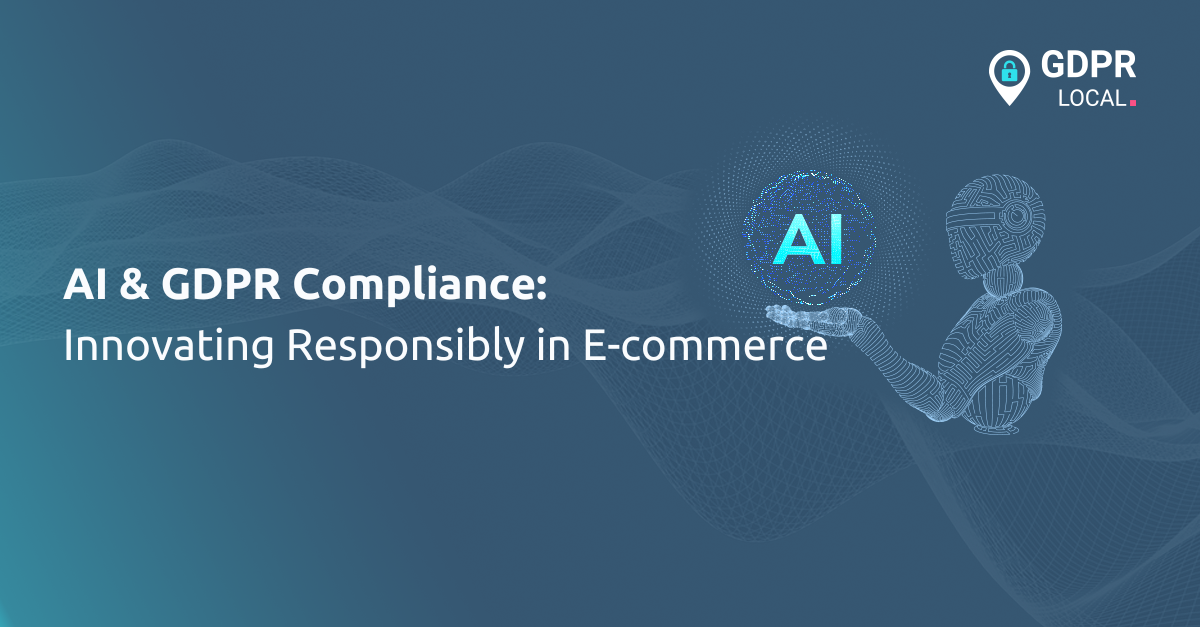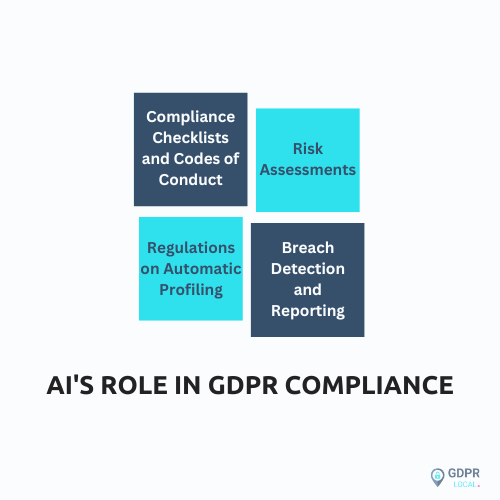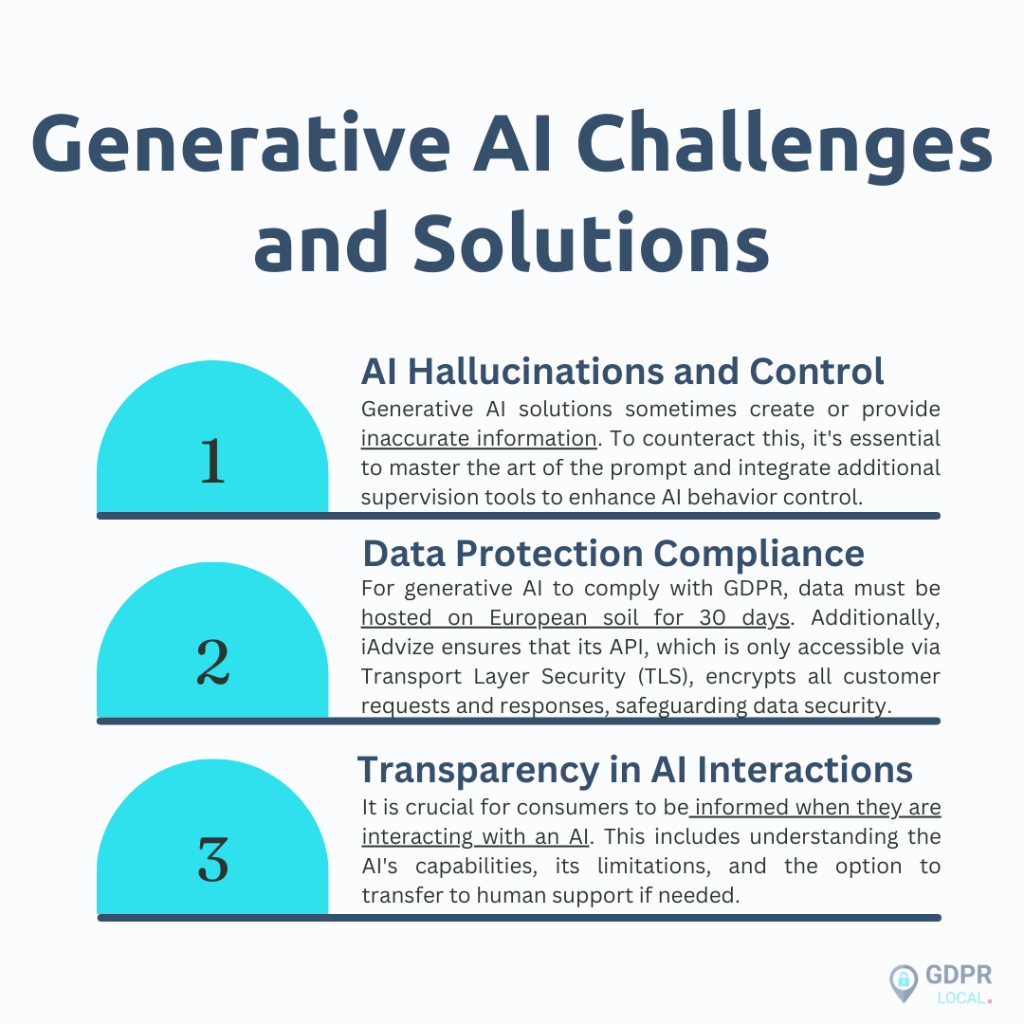
AI and GDPR Compliance: Innovating Responsibly in E-commerce
Updated: October, 2025
The convergence of artificial intelligence (AI) with GDPR regulations is reshaping the e-commerce landscape. GDPR, a pivotal regulation enacted by the European Union in 2018, mandates rigorous standards for the collection and processing of personal data from EU citizens, impacting organisations globally. As online retailers extensively collect consumer data to drive personalised experiences, the integration of AI applications within these frameworks accentuates the importance of navigating GDPR compliance effectively to unlock innovation while safeguarding privacy.
Balancing the dynamism of AI in e-commerce with the stringent requirements of GDPR presents a unique challenge. This article will provide insights into aligning AI advancements with GDPR regulations, offering a roadmap for e-commerce entities to innovate responsibly while adhering to privacy mandates, thereby ensuring a trust-based relationship with their users. GDPRLocal is here to offer support.
The Rise of AI in E-commerce
AI technologies are increasingly integral to e-commerce, revolutionising how businesses interact with customers and manage operations. Here’s how AI is shaping the future of online shopping:
AI-Driven Personalisation and Efficiency
1. Personalised Shopping Experiences: AI algorithms analyse customer data to offer hyper-personalised product recommendations, enhancing the shopping experience and boosting customer satisfaction.
2. Efficiency in Operations: AI optimises inventory management and logistics, significantly improving efficiency in supply chain processes.
Enhancing Customer Interactions
– Chatbots and Virtual Assistants: AI-powered tools handle customer inquiries and support, ensuring 24/7 assistance and improving user experience.
– Natural Language Processing: This AI capability enhances search functionalities, allowing e-commerce platforms to better understand and respond to customer queries.
Security and Fraud Prevention
– Fraud Detection: AI algorithms are crucial in identifying fraudulent patterns, thus protecting both the business and its customers from potential financial losses.
– Data Protection: With the rise of AI, end-to-end encryption and decentralised identity verification are becoming standard practices in e-commerce, safeguarding user data and enhancing privacy.
Strategic Business Insights
Market and Data Analysis: AI tools analyse market trends and consumer behaviour, providing businesses with valuable insights that inform strategic decisions, such as dynamic pricing and product placements.
Future Trends
Growth Projections: The AI-enabled e-commerce market is expected to reach $16.8 billion by 2030, indicating significant investment and growth in this technology.
As AI continues to evolve, e-commerce platforms are not only able to offer more personalised and efficient shopping experiences but are also better equipped to handle security and privacy challenges. GDPRLocal supports businesses in navigating these complexities, ensuring that AI innovations align with GDPR compliance, thus fostering a safer and more trustworthy digital shopping environment.
Understanding GDPR in the Context of AI
AI Compliance with GDPR
1. Regulatory Framework: GDPR sets a robust framework for data protection, significantly influencing AI applications, particularly in sectors like healthcare, finance, and marketing, where personal data is extensively used.
2. Data Protection Requirements: AI systems are required to comply with GDPR mandates such as data minimisation, purpose limitation, and ensuring data accuracy. These are essential to prevent misuse of personal data and to safeguard user privacy.
3. Rights of Individuals: Under GDPR, individuals have rights such as access to their data, the right to erasure, and the right to be informed about how their data is used. AI systems must be designed to facilitate these rights.
Role of AI in Enhancing GDPR Compliance
– Automating Compliance Tasks: AI can streamline various GDPR compliance processes like data protection impact assessments, which reduces the risk of human error and enhances efficiency.
– Data Handling Innovations: AI technologies offer innovative ways to handle data while adhering to GDPR principles such as privacy by design and by default. This includes techniques such as anonymisation and pseudonymisation of personal data.
Challenges and Solutions
– Integration of AI with GDPR: Ensuring that AI systems comply with GDPR involves addressing challenges like the need for explicit consent for using personal data and implementing stringent security measures to prevent data breaches.
– Transparency and Accountability: AI systems must be transparent in their operations and decisions, which is critical for building trust among users. GDPR’s requirement for a right to explanation aligns with the need for explainable AI (XAI) services.
GDPRLocal’s Role in AI and GDPR Navigation
Comprehensive Support: GDPRLocal provides comprehensive services to help e-commerce businesses navigate the complexities of AI and GDPR compliance, ensuring they not only meet regulatory requirements but also build customer trust.
By adhering to GDPR, companies not only comply with legal requirements but also enhance their reputation and build stronger relationships with customers, ensuring their data is handled responsibly and ethically.
Balancing Innovation with GDPR Compliance
AI and GDPR compliance in e-commerce requires a delicate balance, ensuring innovation does not compromise data privacy and security. Here are key strategies and considerations:

1. Compliance Checklists and Codes of Conduct: AI can follow detailed checklists designed to ensure all GDPR mandates are met efficiently.
2. Risk Assessments: AI supports thorough risk assessments, identifying potential data privacy issues before they arise.
3. Regulations on Automatic Profiling: Ensuring AI systems comply with GDPR rules regarding automatic decision-making and profiling.
4. Breach Detection and Reporting: AI systems are instrumental in recognising and reporting security breaches promptly.
GDPR Compliance Checklist for E-commerce
E-commerce platforms can follow this comprehensive GDPR Compliance Checklist provided by Bizway:
| Understand GDPR requirements thoroughly. |
| Conduct a detailed data audit to understand data flows and storage. |
| Update privacy policies to reflect GDPR compliance. |
| Implement necessary data processing agreements. |
| Secure explicit consent for data processing when required. |
| Provide clear data opt-out options for users. |
| Ensure robust data security measures are in place. |
| Establish protocols for data breach response. |
| Appoint a data protection officer if required. |
| Address international data transfer issues. |
| Train your team regularly on GDPR compliance. |
| Review and update compliance measures periodically. |
Transparency and Accountability
GDPR emphasises transparency in AI applications, requiring clear communication about the purposes and limits of AI data processing. Implementing safeguards for profiling and making inferences is crucial for compliance.
Institutional and Policy Framework
A responsible approach to AI-based processing involves aligning with the values of technology, economic viability, and public interest. Data protection authorities provide specific guidance, while political authorities outline broader values and compliance strategies.
Strategic Planning and Risk Management
Balancing AI innovation with GDPR compliance involves strategic planning and a strong focus on cybersecurity. This includes defining AI goals, assessing data readiness, choosing the right tools, and integrating AI into the existing tech stack.
Addressing AI-Driven Marketing and Compliance Risks
AI-driven marketing must avoid perpetuating biases and ensure compliance with regulations like GDPR. Regular assessments and advanced security measures are essential to mitigate risks associated with AI systems.
Data Privacy and Global Data Governance
As AI’s role in lead generation grows, embedding privacy measures from the outset becomes crucial. Companies must also navigate varying international privacy regulations, requiring a harmonised approach to data governance.
By implementing these strategies, e-commerce platforms can innovate responsibly, ensuring that advancements in AI do not come at the expense of user privacy or GDPR compliance. We stand ready to assist businesses in operating these requirements, ensuring both innovation and compliance are managed effectively.
Case Studies: AI Success Stories within GDPR Framework
Tailored Product Suggestions Enhance Customer Experience
AI-driven personalisation is a cornerstone of modern e-commerce, significantly boosting sales and customer satisfaction by offering products that truly match consumer preferences and needs. This approach not only streamlines the shopping experience but also adheres to GDPR by handling data responsibly.
Ensuring Data Integrity and Decision-Making Quality
AI tools are instrumental in addressing data silos and improving decision-making quality within e-commerce platforms. By ensuring data integrity, these tools help businesses comply with GDPR’s stringent data protection requirements, ultimately enhancing overall operational efficiency.
Boosting Customer Service Efficiency
Utilising AI in customer service helps e-commerce platforms manage and process data efficiently, ensuring compliance with GDPR. This leads to improved customer service efficiency and greater customer satisfaction, as AI tools handle inquiries and support issues more swiftly and accurately.
Maintaining Trust and Security in Transactions
AI applications in e-commerce help maintain a high level of trust and security during transactions. This is crucial not only for customer confidence but also for meeting GDPR compliance requirements, which prioritise data security and privacy.
Competitive Edge in a Dynamic Market
By adhering to GDPR guidelines while implementing AI, e-commerce businesses can stay competitive and responsive to market changes. This strategic alignment ensures that innovations do not compromise data privacy, keeping businesses ahead in both technology and compliance.
Operational Efficiency and Informed Decision-Making
AI’s role in enhancing operational efficiency is pivotal. By integrating AI tools, e-commerce platforms can make more informed decisions, streamline operations, and maintain full compliance with GDPR regulations, thus fostering a sustainable business model that respects user privacy.
Challenges and Solutions for AI-driven E-commerce under GDPR
Data Quality and Quantity
AI algorithms thrive on large, high-quality datasets. E-commerce companies face the dual challenge of collecting vast amounts of clean data while adhering to GDPR’s strict privacy regulations. To navigate these waters, partnering with organisations like GDPRLocal can provide guidance on compliant data practices.
Data Privacy and Security
Ensuring the privacy and security of customer data is paramount. Robust encryption and protection measures are essential for maintaining GDPR compliance.
Integration with Existing Systems
The integration of AI with legacy systems presents significant technical and financial challenges. Utilising APIs and cloud-based AI services can streamline this integration, making it less cumbersome and more cost-efficient.
Managing High Initial Costs
AI development can be prohibitively expensive. E-commerce businesses can mitigate these costs by adopting cloud-based AI solutions and launching small-scale projects to demonstrate value before full-scale deployment.
Addressing the Talent Shortage
The demand for skilled AI and machine learning professionals often outstrips supply. E-commerce companies can overcome this by forming partnerships with academic institutions or investing in internal training programs to develop the necessary skills.
Mitigating Algorithm Bias
AI systems can inadvertently perpetuate existing biases, leading to unfair outcomes. Regular audits and updates of AI algorithms are crucial for minimising this risk and ensuring fair treatment of all users.
Building Customer Trust
Customers may be sceptical about AI, fearing for their privacy and the ethical use of their data. Transparent communication about how AI is used and its compliance with GDPR can help in building trust.
Scaling AI Systems
As the business grows, so must its AI capabilities. Scalable cloud-based solutions and regular updates to AI algorithms ensure that systems can handle an increasing load without compromising performance or compliance.
Staying Competitive
In a market where many players are leveraging AI, staying ahead requires continual innovation and adaptation.
Assessing ROI
Determining the financial return on AI investments can be challenging. Continuous monitoring and adjustment of AI strategies are vital for realising a positive return. GDPRLocal helps set realistic goals and measure the effectiveness of AI initiatives.
Future Outlook: AI, E-commerce, and GDPR

GDPRLocal’s Role in Operating AI and GDPR Challenges
At GDPRLocal, we understand the complexities of integrating AI into e-commerce while ensuring GDPR compliance. We provide expertise and support to help businesses navigate these challenges effectively, ensuring that both innovation and data protection go hand in hand. Our services are designed to help e-commerce platforms adopt AI solutions that comply with privacy laws and build consumer trust.
Conclusion
Through the insights and strategies discussed, it is clear that aligning technological advancements with stringent regulatory frameworks is not merely a compliance exercise but a strategic imperative that enhances trust, operational efficiency, and market competitiveness. It is essential for e-commerce platforms to recognise the importance of this synergy to foster a sustainable and trust-based digital economy.
Partnering with GDPRLocal ensures that your journey towards integrating AI in e-commerce aligns with GDPR compliance, setting a solid foundation for sustainable growth and success in the digital marketplace. Contact us today.
FAQs
How do GDPR and AI interact with each other?
The EU AI Act emphasises human oversight, while GDPR Article 22 ensures that individuals have the right to object to decisions made solely by automated processes if those decisions have significant legal effects or similar impacts on them. This relationship underscores the need for careful integration of AI in systems that process personal data to comply with GDPR requirements.
What does GDPR mean for e-commerce businesses?
For e-commerce, the General Data Protection Regulation (GDPR) grants EU and UK customers greater authority over their personal data. This includes how businesses collect, store, and use customer information, ensuring that customer data is handled in a transparent and secure manner.
How does artificial intelligence assist with compliance?
Artificial Intelligence (AI) is instrumental to risk management compliance. It helps predict potential compliance risks and recommend preventive actions. AI systems can monitor transactions in real time and alert to any suspicious activities that might suggest non-compliance or fraudulent activity.
Does GDPR have jurisdiction over data processing outside the EU if the controller or processor is based in the EU?
Yes, the General Data Protection Regulation (GDPR) applies if a company is established in the EU, even if the processing of personal data occurs outside the EU. The location of the data processing is not a determining factor for GDPR’s application; rather, it is the location of the company that controls or processes the data.